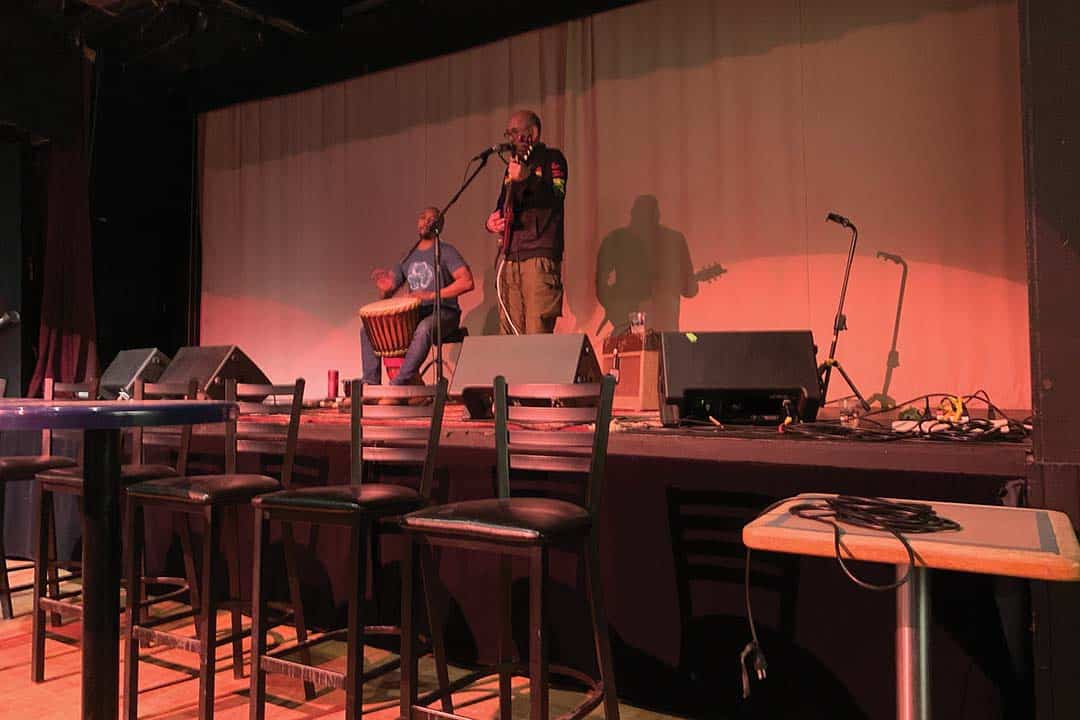On March 2, around 30 people gathered at the Tranzac Club in Toronto for an evening of music, refreshments, and conversations on how service workers are treated on U of T’s campuses.
The event — headlined as “Top Employer for Whom?” — was hosted by the List. The List is a network of university faculty, staff, and students dedicated to promoting equitable access to work and study at the university.
Musical guests Sugar Brown (Ken Kawashima) and Derek Thorne kicked off the night with a lineup including “Bella Ciao,” a song associated with freedom and resistance and Bob Dylan’s “Maggie’s Farm,” which includes the lines “It’s a shame the way she makes me scrub the floor / I ain’t gonna work on Maggie’s farm no more.”
Kiran Mirchandani — professor at the Ontario Institute for Studies in Education — and Michelle Buckley — professor in UTSC’s department of human geography — began the night’s speeches by presenting their research on how caretaking staff on campus are hired and what their employment conditions are like. “We thought it would take us a couple of weeks… two years later, I think we probably have… 10 per cent of the response to this question,” Mirchandani explained, pointing to the university’s decentralized service-work management systems and overall lack of transparency.
In their presentation, Mirchandani and Buckley emphasized the importance of “coalition building” across various labour unions, students, and faculty at U of T to pressure the university to amend its labour practices. Preethy Sivakumar — a representative from CUPE national — noted that Mirchandani and Buckley’s research was used in CUPE local 3261’s Good Jobs U of T campaign last fall. This campaign sought to stop the university from contracting caretaking positions to third-party contractors whose employees have far weaker collective bargaining power.
“We have a real opportunity to confront this multibillion dollar institution and remind it of its obligation to all of its workers,” said Daniel Janvier, a representative from UNITE HERE local 75. This unit represents hospitality workers in the GTA, including food service workers at the university.
Janvier recounted how the union fought for the “right to return to work” during the pandemic, as nearly 90 per cent of its members were laid off. Janvier highlighted that many campus food service workers are people of colour, new immigrants, and women, and that they are also “deeply proud of their connection to the university community.”
Josh Cuasay, also speaking on behalf of UNITE HERE 75, told the story of how he came to become a union leader. “I’m very timid; I didn’t speak up,” Cuasay recounted the first time he attended a union meeting. He eventually realized that he had to take leadership to pursue the changes that he and his co-workers needed. “Who’s gonna do it?… It’s only us.”
Sivakumar said that local 3261 members — service workers on U of T campuses — were told “[a] lot of humiliating things” during the collective bargaining that took place last fall, such as that “robots could do this job.”
In March 2020, the university rolled out the “ECOBOT Scrub 50” to clean campus buildings, citing pandemic-related sanitation requirements and reduced water usage as reasons for the project. Between March 2020 and July 2021, the floor-cleaning robots allowed the university to divert 500 hours of labour to other tasks. However, Sivakumar described the project as ultimately ineffective and a waste of money, calling it “a big joke to the workers.”
Still, Sivakumar praised 3261 members for their successful campaign organizing during the collective bargaining process. She recounted one instance where members marched into a governing council meeting holding brooms and spatulas as they demanded protections for workers’ rights.
The night’s programming ended with a question and answer session, during which attendees and speakers discussed concerns and strategies for future collective action surrounding campus workers’ rights.
U of T Media Relations declined The Varsity’s request for comment on this event and the labour unions’ criticisms.


